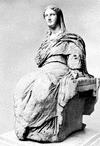- Demeter
-
/di mee"teuhr/, n.the ancient Greek chthonian goddess of agriculture and the protector of marriage and the social order, identified by the Romans with Ceres. She presided over the Eleusinian mysteries.
* * *
In Greek religion, a consort of Zeus and the goddess of agricuture, especially grain.Though rarely mentioned by Homer and not an Olympian deity, she is probably an ancient goddess. She is best remembered for her role in the story of Persephone, in which her lack of attention to the harvest causes a famine. In addition to appearing as a goddess of agriculture, Demeter was sometimes worshiped as a divinity of the Underworld and as a goddess of health, birth, and marriage. Demeter of Cnidus, sculpture, mid-4th century BC; in the British Museum.Courtesy of the trustees of the British Museum
Demeter of Cnidus, sculpture, mid-4th century BC; in the British Museum.Courtesy of the trustees of the British Museum* * *
in Greek religion, daughter of the deities Cronus and Rhea, sister and consort of Zeus (the king of the gods), and goddess of agriculture. Her name indicates that she is a mother.Demeter is rarely mentioned by Homer, nor is she included among the Olympian gods, but the roots of her legend are probably ancient. The legend centred on the story of her daughter Persephone, who was carried off by Hades, the god of the underworld. Demeter went in search of Persephone and, during her journey, revealed her secret rites to the people of Eleusis, who had hospitably received her (see Eleusinian Mysteries). Her distress at her daughter's disappearance was said to have diverted her attention from the harvest and caused a famine. In addition to Zeus, Demeter had a lover, Iasion (a Cretan), to whom she bore Plutus (Wealth; i.e., abundant produce of the soil).Demeter appeared most commonly as a grain goddess. The name Ioulo (from ioulos, “grain sheaf”) has been regarded as identifying her with the sheaf and as proving that the cult of Demeter originated in the worship of the grain mother. The influence of Demeter, however, was not limited to grain but extended to vegetation generally and to all the fruits of the earth, except the bean (the latter being the province of the hero Cyamites). In that wider sense Demeter was akin to Gaea (Earth), with whom she had several epithets in common, and was sometimes identified with the Great Mother of the Gods (Cybele, also identified with Rhea).Another important aspect of Demeter was that of a divinity of the underworld; she was worshiped as such at Sparta, and especially at the festival of Chthonia at Hermione in Argolis, where a cow was sacrificed by four old women. The epithets Erinys (“Avenger”) and Melaina (“the Black One”) as applied to Demeter were localized in Arcadia and stress the darker side of her character.Demeter also appeared as a goddess of health, birth, and marriage. A certain number of political and ethnic titles were assigned to her, the most important being Amphiktyonis, as patron goddess of the Amphictyonic League, subsequently well known in connection with the temple at Delphi.Among the agrarian festivals held in honour of Demeter were the following: (1) Haloa, apparently derived from halōs (“threshing floor”), begun at Athens and finished at Eleusis, where there was a threshing floor of Triptolemus, her first priest and inventor of agriculture; it was held in the month Poseideon (December). (2) Chloia, the festival of the grain beginning to sprout, held at Eleusis in the early spring (Anthesterion) in honour of Demeter Chloë (“the Green”), the goddess of growing vegetation. This festival is to be distinguished from the later sacrifice of a ram to the same goddess on the sixth of the month Thargelion, probably intended as an act of propitiation. (3) Proerosia, at which prayers were offered for an abundant harvest, before the land was plowed for sowing. It was also called Proarktouria, an indication that it was held before the rising of Arcturus. The festival took place, probably sometime in September, at Eleusis. (4) Thalysia, a thanksgiving festival held in autumn after the harvest in the island of Cos. (5) The Thesmophoria, a women's festival meant to improve the fruitfulness of the seed grain. (6) The Skirophoria held in midsummer, a companion festival.Her attributes were connected chiefly with her character as goddess of agriculture and vegetation—ears of grain, the mystic basket filled with flowers, grain, and fruit of all kinds. The pig was her favourite animal, and as a chthonian (underworld) deity she was accompanied by a snake. In Greek art Demeter resembled Hera, but she was more matronly and of milder expression; her form was broader and fuller. She was sometimes riding in a chariot drawn by horses or dragons, sometimes walking, or sometimes seated upon a throne, alone or with her daughter. The Romans identified Demeter with Ceres.* * *
Universalium. 2010.
